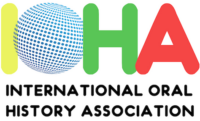
NARRATING WORKING LIVES: RUPTURES, TURNING POINTS, TRAJECTORIES
Vth INTERNATIONAL ORAL HISTORY CONFERENCE,
GREEK ORAL HISTORY ASSOCIATION
RETHYMNON, 29-31 MAY 2020
Work is a crucial feature of most people’s lives. Labour history based on the living memory of working people has marked the oral history movement since the 1970s, recovering in particular the voices of industrial workers. Since the end of the 1980s, however, the transition to the post-industrial era has thoroughly disrupted – over the lifespan of one generation – both the experience of work and the horizon of expectations of working people. Closures or relocations of firms, the deregulation of labour relations, de-skilling, mass layoffs and the generalization of precarity has had a profound impact on the working lives of men and women, although not always in similar ways. On the other hand, these developments have also transformed the way in which the notion of “work” is conceptualized. Professional identities and the connections between work experiences and other aspects of people’s lives are influenced in multiple ways by these processes.
In post-war Greece work relations were transformed through urbanization, mass employment of women and – since the 1990s – by the replacement of local workers by immigrants, especially in agriculture, fishery and the building sector. The recent economic crisis deepened the consequences of de-industrialization, globalization and the financialization of the economy, changing people’s lives at staggering speed. Those parts of the planet belonging to the so-called “Global South”, including Greece, provide a promising field to study these changes.
The conference intends to encourage the use of oral history and biographical research in order to explore the ruptures, the “biographical turns” and the transformations of identities and subjectivities voiced in the life stories of people in and out of work. In this sense, oral history, as a field of interdisciplinary and critical reflections, may bring an important contribution to the renewal of labour history. The conference welcomes proposals which use recorded life stories to document and understand the transformations of working lives over the last fifty years. Suggested topics may include:
- Changes in the organization of work: forms of labour, social relations and work culture
- Work-related precariousness and subjectivity
- Work, family and community
- Child labour
- Gendered, class and ethnic dimensions of work
- The working body and attitudes to risk
- Trade unions and workers’ movements
- The experience of job loss and unemployment
- Changes in the working conditions and the professional careers of teachers
- Work and migration
- Work volunteering and apprenticeships
- The use of oral testimony in public representations of work
The conference languages are Greek and English. Proposals should include your name and affiliation, the title of your paper and an abstract of 200-250 words. Please clarify in which way your proposal is based on oral sources. The proposal should be sent to kfagogenis@gmail.com and rvboes@gmail.com by February 10, 2020. You will be informed on the decisions reached by the Scientific Committee by 31 March 2020.
The conference is organized by the Greek Oral History Association and hosted by the Sociology Department of the University of Crete.
Organizing Committee
Antonis Antoniou, University of Thessaly
Vassilis Dalkavoukis, Democritus University of Thrace
Eleni Kallimopoulou, University of Macedonia, Thessaloniki
Maria Karastergiou, University of Macedonia, Thessaloniki
Maria Kavala, Aristotle University of Thessaloniki
Giorgios Tsiolis, University of Crete
Riki Van Boeschoten, University of Thessaly
Kostas Fagogenis, University of Crete
Scientific Committee
Eleni Fournaraki, University of Crete
Pothiti Hantzaroula, University of the Aegean
Christina Karakioulafi, University of Crete
Dimitra Kofti, Panteion University, Athens
Dimitra Lambropoulou, Capodistrian University of Athens
Irini Siouti, Institute of Social Research, Frankfurt
Manos Spyridakis, University of the Peloponnese
Aris Tsantiropoulos, University of Crete
Riki Van Boeschoten, University of Thessaly
Yiannis Zaimakis, University of Crete
